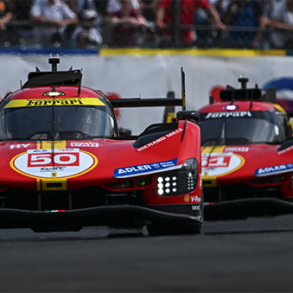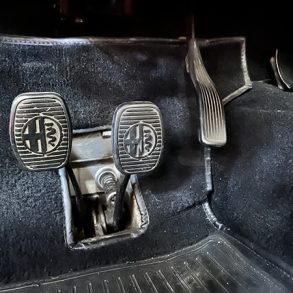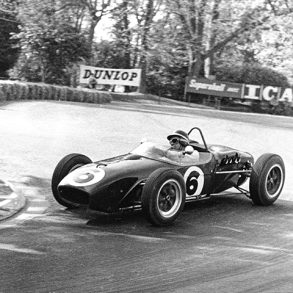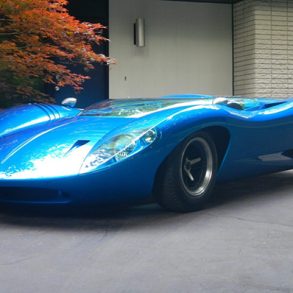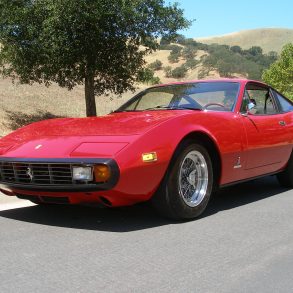Ok, Ok… here’s the pitch. You’ve got this kinda mush-mouthed, body-builder guy who is a washed-up racecar driver, see? We’ll get a big name to play him like Sly Stallone – movie sells itself at this point, right? And his former owner – let’s say he’s wheelchair-bound like Frank Williams, only with a really horrible facelift – anyways, the owner calls him out of retirement to teach this young kid how to hum in his helmet in order to win races. You with me so far, chief? Now the kid’s nemesis – let’s call him Dieter – is a handsome but totally uncompelling, teutonic automaton… kind of a miniature racing version of Arnold Schwarzenegger, only we can’t afford him so we’ll hire some guy who looks the part and we’ll teach him how to act along the way. Now here’s where it gets good… these guys race for what we’ll call the “World Championship,” only it won’t be Formula One, because those guys wouldn’t really give us the time of day. Instead, we got approval from these other guys called CART to do whatever we want at all their races and yet we don’t have to mention their names once in the movie! Isn’t that great?! So anyways, we take Stallone and a bunch of good looking, talentless kids, we string together some really loud techno music (the kids love this stuff), with a lot of video-game-like animation and just a skosh of real racing footage and BAAAM! We’re talking box office baby! Big Box office. What’s that? The script? Who needs a script when you got Stallone! Besides, there’s no budget for a script. No, we solved that problem by getting Sly to write the script. Come on, how hard can it be??
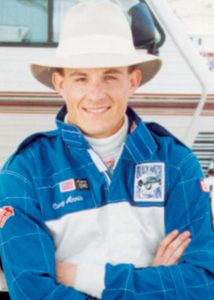
Sound hard to believe? Does to me too. And yet a lot of high paid knowledgeable people had to buy into this “concept” to turn it into the stomach-turner they call “Driven.” In case you couldn’t tell by now, I hated the movie. HATED IT. And yet I wanted so badly to like it. After all, it’s only once every 10-15 years that someone works up the funding and the cojones to make a racing film. These usually fall into one of two categories: those true to the sport that are box office disasters (i.e., “Grand Prix” and “Le Mans”); or those that do reasonably well at the box office but portray a shallow, myopic view of the world of racing (i.e., insert any other racing movie except “Grand Prix” and “Le Mans” here).
When the hype for Stallone’s “Driven” started (and it was some serious hype, let me tell you), they (being Stallone and director Renny Harlin) were talking about how this would be one of the first racing movies true to the sport and its drivers. Oh, how I wanted to believe them. I tried… really I did! It sounded promising – CART was giving them full access and support. They were even using a lot of the drivers in the making of the movie (my wife thinks the movie would have been infinitely better if they had let the real drivers do all the acting!). But I knew, in order to be fair to the movie, I’d have to tune out the hype, keep my expectations at zero and go and see the movie with a totally clear, unbiased mind. So opening night, my wife and I and another couple, who are avid race fans, sat in one of the best theatres in Southern California to watch Stallone’s magnum opus (or is it flopus?).
Within about 20 minutes, we were looking at each other incredulously and asking, “Is this a joke?” I swear to you – as the spirits of Enzo Ferrari and Colin Chapman are my witnesses – that I’ve seen original high school productions that were better written, better acted and much more believable. “Driven” was seriously embarrassing. Embarrassing to the people who made it, embarrassing to racing and, unfortunately, embarrassing to CART. In fact, if I were Jesse Alexander, who just released a marvellous book of his racing photography called Driven, I’d sue the producers for the damage this movie will do to his reputation by association.
I guess what bothers me almost as much as the wasted time and money on this turbocharged stinker, is the fact that I know there is a really good script floating around Hollywood about the life of Enzo Ferrari (based on Brock Yates’ insightful book). But chances are it won’t see the light of day until the bitter taste of “Driven” leaves the palates of Hollywood’s power brokers. And if history is any indication… that should take between 10 and 15 years!





